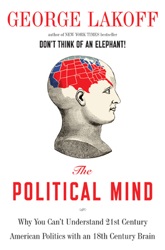Original Post by David Pescovitz, June 23, 2008 11:03 AM
George Lakoff is well known as a cognitive linguist who looks at how language affects culture, specifically how much the metaphors we use impact the way we think. During the last presidential election, he grabbed a lot of attention with his book Don't Think of an Elephant: Know Your Values and Frame the Debate, about how Republicans are masters at "framing" debates to their benefit. His new book, The Political Mind, explores the same territory but in the context of cognitive science. The New York Times reviewed The Political Mind yesterday and it sounds fascinating. From the NYT:

Lakoff blames "neoliberals" and their "Old Enlightenment" mentality for the Democratic Party's weakness. They think they can win elections by citing facts and offering programs that serve voters' interests. When they lose, they conclude that they need to move farther to the right, where the voters are.
This is all wrong, Lakoff explains. Neuroscience shows that pure facts are a myth and that self-interest is a conservative idea. In a "New Enlightenment," progressives will exploit these discoveries. They'll present frames instead of raw facts. They'll train the public to think less about self-interest and more about serving others. It's not the platform that needs to be changed. It's the voters.
The basis of Lakoff's theory is simple: the mind is the brain. Any connection that forms between your thoughts also forms between your neurons. As you internalize a metaphor, a circuit in your brain "physically constitutes the metaphor." This parallel development continues as mental complexity increases. "Narratives are brain structures," he proposes.
Link to NYT review, Link to buy The Political Mind: Why You Can't Understand 21st-Century American Politics with an 18th-Century Brain
Previously on BoingBoing:
"¢ George Lakoff on how to argue with conservatives Link
"¢ George Lakoff on why the conservatives seem to be winning Link
